
[November, 1995] Traveling in a foreign country is not like going to an amusement park where all the sites, food, and facilities are laid out for your convenience. The traveling, especially the walking, from site to site can be difficult even grueling. You always need a detailed map and should learn how to use the local public transportation system though these are said to be the favorite haunts of pickpockets (we've been lucky to avoid pickpockets perhaps with an ounce of caution). Ordering food is one of the most difficult aspects of traveling since everything is often in a foreign language and usually the familiar foods don't tast anything like the "foreign" food back home. Always be suspicious of specific places to eat and shop listed in guidebooks, you can usually do better with chance. The most basic advice a traveler should abide by is don't take too many clothes and luggage; and watch what others do when in doubt about what to do. You get the best rate of exchange if you purchase food and souveniers with credit cards (the cash advance machines in Amsterdam don't take Visa-1995). Always search around for the best exchange rates and lowest commissions when exchanging money, often times large banks will give the best exchange rate. Buy inexpensive provisions at a deli-type store or a grocery store before taking several-hour-long train trips, the food will be less expensive, you'll have a larger variety of choices, and it will probably taste better than that food on the train. Purchase train tickets and get reservations (usually a supplement to Eurail passes) a day in advance, two days if you plan to get a couchette (a sleeper on a train; always a steep supplement to Eurail passes but worth it for overnight travel-trust me we've tried it both ways). Carry small change with you whenever sightseeing because you invariably have to pay the W.C. attendants if you need to use the toilets nearby. Even when I used a W.C. in the basement of a cafe, I was charged for it. Carry toilet paper with you in Southern Europe because many public restrooms won't be equipped with it. Get rid of small change before leaving a country since you'll be stuck with it if you don't. When backpacking, purchase small padlocks to lock your zippers together, tourists are obvious targets for thieves. And finally, using the trains and public transportation is highly recommended for city traveling, but cars are an unfortunate necessity if you want to see the countryside (an option is to take bicycles together with trains). Driving in Europe can be incredibly stressful even if you don't drive in Ireland and England where they drive on the left-hand side of the road because every country has its own unique way of giving directions and getting lost is something that is too easy to do.
Throughout Europe, we usually called for a room from our guidebook a day in advance. The rooms and amenities such as a toilet and shower varied from city to city, and we usually had to share these amenities which were located outside our room with others though we had a sink in our room. This is what made our accomodations vastly cheaper than in hotel rooms with shower-bathrooms included. We had paid nearly $150 for a regular hotel room that had a slightly better view than a "Bed and Breakfast" we stayed at later in the same city but latter cost us a mere $50-a-night. These accommodations were always clean. Look for places run by couples and with as few rooms as possible, they are invariably the most comfortable places to stay. Once in Germany and for our stay in Prague, we used information at the train stations to find a place to stay. In Germany and Ireland we stayed at B&B houses that we saw as we drove by. Theye were not always clearly marked in Germany as in Ireland where the places we chose usually had a clover displayed on a sign designating them as a tourist board approved B&B. The one place we chose without this approval in Ireland turned out to be dirty and smelly as well! The breakfast served at B&Bs in continental Europe usually consisted of breads, cheeses, and jams with tea or coffee and sometimes juice and a boiled egg. The English breakfast we had consisted of a fried egg, beans, toast, tea, bacon (similar, but inferior to the bacon in Ireland), and a tomato. The Irish breakfast was the heartiest we've ever eaten in our life consisting of a fried egg, toast (though not the variety of bread found on the continent), two different varieties of sausage (four pieces), bacon (a couple of pieces which were actually a strip of bacon and ham in once piece), cereal and milk, a small glass of juice, and tea. Since these breakfasts were usually included in the B&B price they were a life saver in Europe where a meal may cost at least twice as much as a comparable meal in the U.S.
This page has been indefinitely removed from the main Cultural Bridge website. The author suggests that readers read the linked preface before going forward.

It is natural to be suspicious of your own initial impressions of a place especially if your visit is brief and you don't speak the language. This doesn't invalidate your impressions, afterall first impressions are often very profound, but it does beg that these impressions be viewed within the context that they were formed.

On a warm late April day, I walked through the streets of Brindisi, a port town on the eastern coast of Italy, where the streets were lined with two-story-high buildings which had picturesque wooden window shutters facing the street. Men in their 50's and 60's gathered in small groups to talk on the sidewalk as a pair of policemen monitored traffic here and there where the Fiat was obviously king.
The men's W.C. at the train station in Brindisi had seven stalls, all except one of which had a paper sign announcing "guato". I tried the handle on the door without the sign and it was locked so I tried a couple of doors with the sign as well. A man doing his business at a urinal looked up at me and yelled, "guato" as if he was trying to educate me. After I kept returning to the bathroom several times to see if the stall without the sign had been vacated rather than just "guato" like all the rest, a female janitor looked in the men's W.C. as if to see if anything was wrong before she went back to her little office closet. Apparently "guato was out of her jurisdiction.
Italians are the most aggressive pedestrians and drivers I have seen. It's as if going from place to place is a devious game to see how many people you can intimidate in your path. More people bumped into us in Italy, I believe, than in any other combination of countries combined for any like period of time. Fortunately when they drive it is more a game of bluff. Italians in their cars never seem willing to stop at intersections for pedestrians, but always give the right-of-way to a pedestrian at the last possible moment without a word of complaint.
There were only two times that we took a train while traveling through Europe were it could be said the number of passengers was oppressive. The first trip was the route from Rome to Florence, and there appeared to be more people in the aisles than the seats. It was unclear if the conductors merely could not handle the crowd or if Italians knew that this was an inexpensive trip because our tickets were never checked on this trip as on the other, slightly less crowded train trip we took later through Italy.

Senate and the People of Rome

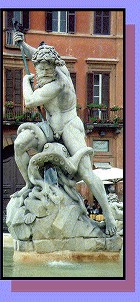
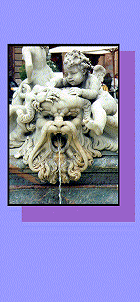
Rome is the Western World's second home of antiquity, sacked by the barbarians after sewing the seeds of Western culture that live on to this day. It's the city of Madonna and a city within a city where the Catholic Pope John Paul resides. It's a city were the most beautiful water fountains in the world are a reminder of the achievements of the forefathers, who in antiquity furnished Western Europe with aqueducts that exist to this day.

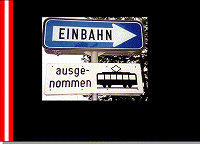

Vienna is a memorial to the Hapsburg dynasty and the empire of Austria-Hungary where the people don't walk too much. Central Vienna is rather small, but Wienners seem to prefer public transportation: busses, trams, and the U-bahn, and many people ride their bikes or drive cars as well.

The Fiat is king in Italy, and the Skoda is king in the Czech Republic. I was surprised to find that the subway system in Prague was better than any subway system I've seen in America (that includes NYC, San Francisco, and Chicago) even though it is a legacy of the USSR-the station near Hradcany Castle still has designs from the days of the CSSR and the trains have Russian Cryllic writing on them suggesting they were made in the USSR.
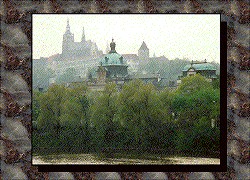
I had read a little bit about Prague before arriving there and expected to see an unusual amount of American entrepreneurs exploiting a country struggling to deal with capitalism after five decades of communism. I also expected to see something of a lawless society as the Czech Republic struggled to deal with an entirely different economic system which required freedoms previously unheard of and allowed abuses that time had not been adequate enough to deal with. Aside from an American laundromat owner who seemed to be fairly successful, I didn't see the foreign, exploitative entrepreneurs I had expected during my brief visit. There were three experiences that we had though that were unique in some respect to Prague. We saw two women leave a man outside a jewelry store on Wenceslas Square, the principal tourist street in Prague, just as the women were about to enter the store. The man was dressed up, but in a cheap looking sort of way. The women were dressed up to flatter their bodies. I only saw the face of one of the women and she looked too extravagant by herself. More importantly, the demeanor of the women was clearly more of those prepared to offer a service to someone rather than entering an establishment where your carriage would usually suggest a desire to be treated as potentially important customers.
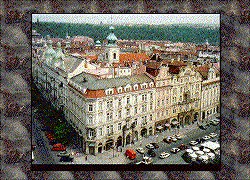
The subway trains in Prague were often colorfully painted with advertisements and I saw stickers representing a local radio station above the door of several trains as if the public subway was supporting the radio station. The lack of graffiti on the trains and the uniformity of the way these stickers had been applied on different trains suggested that they were not applied by kids or representatives of the radio station themselves.
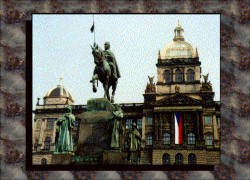
Just when we were leaving Prague we had to walk by a large puddle of what looked unmistakably like blood. Within this puddle was what appeared to be chunks of some internal organs. Of course we could only speculate, just as a couple of Czech men walking behind us did and we didn't know - if it was what we thought - if it was from a human or some other animal.
P>

